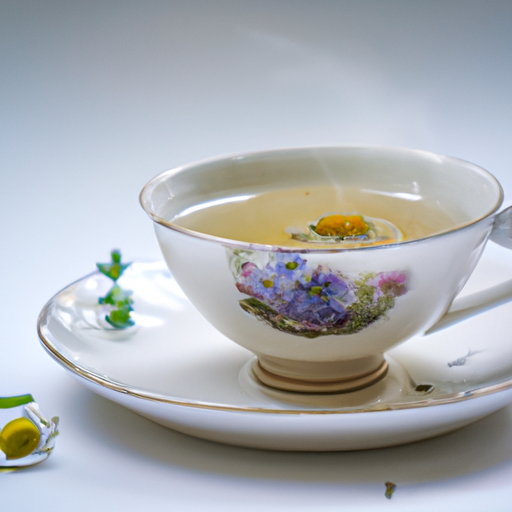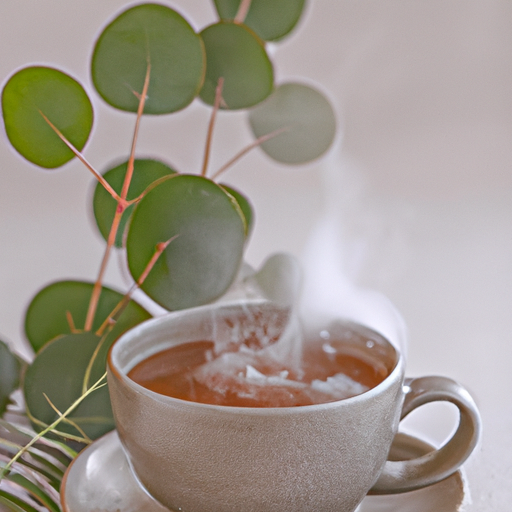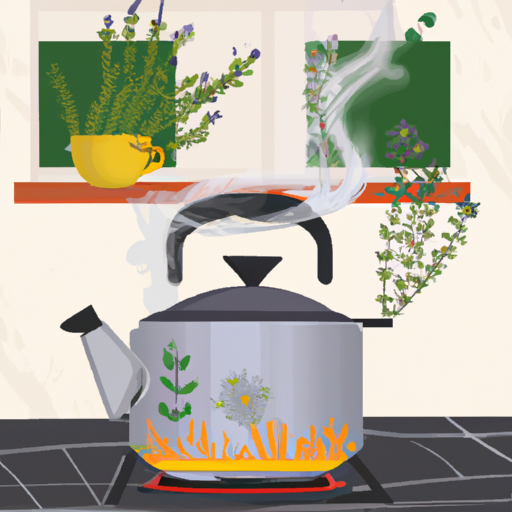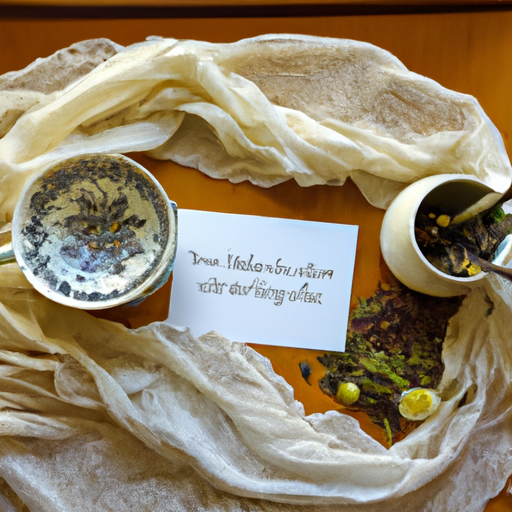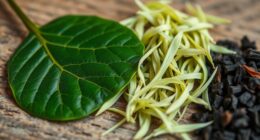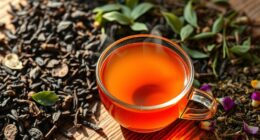It’s amazing how a simple cup of herbal tea can work wonders for soothing those pesky cramps. As someone who has experienced the discomfort and pain that comes with menstrual cramps, I’ve often turned to the power of nature to find relief. And let me tell you, it’s been a game-changer.
Imagine sipping on a warm cup of chamomile tea, feeling its gentle waves of relaxation wash over you. Or indulging in the refreshing coolness of peppermint tea, as it eases the tension in your muscles. The zingy kick of ginger tea can work wonders in reducing inflammation and improving blood flow. And let’s not forget the soothing properties of raspberry leaf tea, cramp bark tea, lemon balm tea, fennel tea, and cinnamon tea.
These herbal teas, backed by centuries of holistic wisdom and supported by scientific evidence, offer a natural and effective way to alleviate cramps. So, if you’re tired of relying on painkillers or looking for a more holistic approach, join me on this journey as we explore the incredible benefits of herbal teas for cramp relief.
Key Takeaways
- Cinnamon tea possesses anti-inflammatory properties, reducing pain and inflammation associated with cramps.
- It regulates menstrual cycles and can help alleviate discomfort and swelling associated with cramps.
- Cinnamon tea balances hormone levels, supporting overall well-being during the menstrual cycle.
- Brewing and enjoying cinnamon tea is an easy and comforting way to provide natural relief for cramps.
Chamomile Tea
If you’re looking for a natural way to soothe your cramps, chamomile tea is the perfect option for you! Chamomile tea is well-known for its calming properties, making it an excellent choice for relaxation and sleep.
Not only does it help to ease cramps, but it also promotes a sense of tranquility and aids in achieving a restful night’s sleep. To make a delicious and soothing chamomile tea blend, simply steep a chamomile tea bag in hot water for about 5 minutes. If you prefer a stronger flavor, you can add a few dried chamomile flowers to the tea bag.
Sip on this warm and fragrant tea to naturally alleviate your cramps and promote overall well-being.
Now, let’s move on to the next herbal tea that can help with cramps – peppermint tea.
Peppermint Tea
Indulging in a soothing cup of peppermint infusion is an effective way to find relief from those pesky stomach discomforts. Peppermint tea has been used for centuries to aid digestion and promote a healthy gut. The natural compounds in peppermint, like menthol and menthone, have been shown to relax the muscles of the gastrointestinal tract, reducing cramps and bloating. Additionally, sipping on this refreshing herbal tea can also help alleviate headaches. The menthol in peppermint has a cooling effect and can provide relief from tension headaches. To further illustrate the benefits of peppermint tea, consider the following table:
| Peppermint Tea Benefits | |
|---|---|
| Aids Digestion | ✔️ |
| Relieves Cramps | ✔️ |
| Reduces Bloating | ✔️ |
| Alleviates Headaches | ✔️ |
| Soothes the Mind | ✔️ |
Transitioning into the next section about ginger tea, it’s worth exploring the wonders of another herbal remedy for cramps.
Ginger Tea
When you’re experiencing stomach discomfort, a warm cup of ginger tea can be your go-to remedy. It provides soothing relief and calming effects. Ginger tea, derived from the root of the ginger plant, has been used for centuries due to its numerous health benefits. It not only helps alleviate cramps but also aids in digestion, reduces inflammation, and boosts the immune system.
To make a refreshing cup of ginger tea, simply steep a few slices of fresh ginger in hot water for about 10 minutes, then strain and enjoy. The spicy and aromatic flavor of ginger adds a pleasant kick to the tea, making it a delightful beverage to sip on.
Transitioning into the benefits of raspberry leaf tea, let’s explore another herbal remedy that can help ease menstrual cramps.
Raspberry Leaf Tea
Improve your overall well-being by incorporating the invigorating effects of raspberry leaf tea into your daily routine. Raspberry leaf tea is known for its numerous health benefits, particularly for women experiencing menstrual cramps. It is rich in vitamins, minerals, and antioxidants that can help alleviate cramps and promote hormonal balance.
To prepare raspberry leaf tea, simply follow these easy steps:
- Boil water in a kettle or pot.
- Place one teaspoon of dried raspberry leaves in a tea infuser or teapot.
- Pour the boiling water over the leaves and let it steep for 5-10 minutes.
- Remove the tea infuser or strain the leaves from the teapot.
- Enjoy your warm and soothing cup of raspberry leaf tea.
Transitioning into the subsequent section about ‘cramp bark tea’, another herbal tea that can provide relief from cramps, let’s explore its benefits and preparation.
Cramp Bark Tea
Relieve your discomfort and find solace with a comforting cup of cramp bark tea. This herbal tea has been used for centuries to alleviate menstrual cramps and other forms of muscle spasms.
The benefits of cramp bark tea are numerous. It contains natural compounds that help relax the muscles and reduce inflammation, providing relief from cramps and pain.
To prepare cramp bark tea, start by boiling water and adding one teaspoon of dried cramp bark to a cup. Let it steep for 10-15 minutes, then strain and enjoy. For maximum benefits, drink this tea regularly during your menstrual cycle or whenever you experience cramps.
Now, let’s move on to the next herbal tea, lemon balm tea, which also offers relief from cramps.
Lemon Balm Tea
Lemon Balm Tea is a wonderful herbal remedy that I’ve found to have calming and soothing effects. It’s been used for centuries to help relax the mind and promote a sense of tranquility.
Additionally, Lemon Balm Tea is known for its ability to relieve muscle tension and cramps, making it a great choice for those seeking natural relief from these discomforts.
Calming and soothing effects
Despite what people may think, herbal teas can actually exacerbate cramps instead of calming them. However, there are certain herbal teas that have calming and soothing effects, which can help alleviate cramps.
One such tea is Lemon Balm Tea. This delightful herbal infusion is known for its calming effects on the body and mind. It can promote relaxation and reduce stress, which can be beneficial for those experiencing cramps.
Incorporating relaxation techniques such as deep breathing and meditation while sipping on a warm cup of Lemon Balm Tea can further enhance its effects. This combination of natural remedies can help relieve muscle tension and cramps, providing much-needed relief.
So, let’s explore how Lemon Balm Tea can help in the subsequent section about relieving muscle tension and cramps.
Relieves muscle tension and cramps
Ease your muscle tension and cramps with the calming effects of Lemon Balm Tea, providing a soothing sensation that will leave you feeling relaxed and revitalized. When it comes to relieving muscle tension and cramps, Lemon Balm Tea is a natural remedy that has been used for centuries. This herbal tea is known for its ability to relax the muscles and promote a sense of calmness. It contains compounds that have been shown to reduce muscle spasms and inflammation, providing relief from cramps. Additionally, Lemon Balm Tea can be enjoyed as part of a relaxation technique, such as sipping it slowly while practicing deep breathing or incorporating it into a hot water therapy routine. This holistic approach can enhance its effectiveness in relieving cramps. Transitioning to the next section, let’s explore the benefits of fennel tea.
Fennel Tea
If you’re looking for a herbal tea that actually works to alleviate cramps, then may I suggest giving Fennel Tea a try? Fennel tea is known for its numerous benefits, and one of them is its ability to relieve muscle tension and cramps.
This natural remedy has been used for centuries to ease the discomfort associated with cramps, thanks to its anti-inflammatory and antispasmodic properties.
To make fennel tea, simply steep one teaspoon of crushed fennel seeds in a cup of hot water for about 10 minutes. You can add a touch of honey or lemon to enhance the flavor.
Fennel tea is not only delicious but also a great option for soothing those pesky cramps.
Speaking of soothing teas, let’s move on to the next one – cinnamon tea.
Cinnamon Tea
Cinnamon tea is a wonderful herbal remedy that I’ve found to have incredible benefits for women’s health. It not only possesses anti-inflammatory properties that can help soothe menstrual cramps, but it also has the ability to regulate menstrual cycles. I’ve personally experienced a reduction in cramps and more regular periods since incorporating cinnamon tea into my routine.
Anti-inflammatory properties
Reduce your cramps by enjoying a cup of herbal tea that contains anti-inflammatory properties. Cinnamon tea, known for its delicious taste and warming aroma, offers more than just a comforting beverage. It boasts anti-inflammatory benefits that can provide natural pain relief for those troublesome cramps.
The active compounds found in cinnamon, such as cinnamaldehyde, have been shown to reduce inflammation in the body. By sipping on a cup of cinnamon tea, you can help alleviate the discomfort and swelling associated with menstrual cramps.
But that’s not all! Cinnamon tea also regulates menstrual cycles and reduces cramps, making it a powerful ally in soothing your monthly woes.
So go ahead, brew yourself a cup of cinnamon tea and let its anti-inflammatory properties work their magic.
Regulates menstrual cycles and reduces cramps
Brewing a cup of cinnamon tea is like having a soothing conductor for your monthly symphony, regulating cycles and easing discomfort. Cinnamon, with its warm and spicy flavor, has been used for centuries to support women’s health. This herbal tea has been found to regulate hormones and reduce pain associated with menstrual cramps. Studies have shown that cinnamon contains compounds that have anti-inflammatory properties, which can help alleviate the pain and inflammation caused by cramps. Additionally, cinnamon tea can help regulate menstrual cycles by balancing hormone levels.
To better understand the benefits of cinnamon tea, let’s take a look at the table below:
| Benefits of Cinnamon Tea |
|---|
| Regulates hormones |
| Reduces pain |
| Anti-inflammatory |
| Balances hormone levels |
| Supports women’s health |
By incorporating cinnamon tea into your daily routine, you can naturally and holistically support your body during your menstrual cycle, reducing discomfort and promoting overall well-being.
Frequently Asked Questions
How long should I steep herbal tea for maximum effectiveness in relieving cramps?
For maximum effectiveness in relieving cramps, I recommend steeping herbal tea for around 5-10 minutes. To enhance its benefits, consider adding a squeeze of lemon or a dash of honey. Enjoy this natural remedy for soothing relief.
Are there any potential side effects or interactions with medications when consuming herbal tea for cramps?
When consuming herbal tea for cramps, it’s important to be aware of potential side effects and interactions with medications. It’s always best to consult with a healthcare professional to ensure safety and effectiveness.
Can herbal tea completely eliminate menstrual cramps, or is it more effective in reducing their intensity?
Herbal teas are a natural way to alleviate menstrual cramps. While they may not completely eliminate cramps, they are effective in reducing their intensity. Different types of herbal teas, such as chamomile and ginger, can provide relief.
Are there any specific dosages or recommended amounts of herbal tea to consume for cramp relief?
Dosage recommendations for herbal teas vary depending on the specific herb and individual needs. Some of the best herbal teas for cramp relief include chamomile, ginger, and peppermint. It is important to consult with a healthcare professional for personalized advice.
Can herbal tea be used as a preventative measure to reduce the occurrence of menstrual cramps in future cycles?
Herbal tea can be a soothing and effective preventive measure for reducing menstrual cramps. By incorporating alternative remedies and preventive measures, we can holistically address cramp relief and promote natural healing.
Conclusion
In conclusion, when it comes to finding natural relief for cramps, herbal teas can be a soothing and holistic option. Symbolically, these teas represent the gentle healing power of nature, providing a comforting embrace for our bodies.
Chamomile, peppermint, ginger, raspberry leaf, cramp bark, lemon balm, fennel, and cinnamon teas all offer evidence-based benefits for alleviating cramps. Incorporating these herbal remedies into your routine can nurture your well-being, allowing you to find harmony and ease during those uncomfortable times. Trust in the wisdom of nature and find solace in a warm cup of herbal tea.

